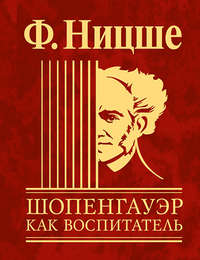 полная версия
полная версияHuman, All-Too-Human: A Book For Free Spirits; Part II
Advantage and Disadvantage in the Same Misunderstanding. – The mute perplexity of the subtle brain is usually understood by the non-subtle as a silent superiority, and is much dreaded whereas the perception of perplexity would produce good will.
246The Sage giving Himself out to be a Fool. – The philanthropy of the sage sometimes makes him decide to pretend to be excited, enraged, or delighted, so that he may not hurt his surroundings by the coldness and rationality of his true nature.
247Forcing Oneself to Attention. – So soon as we note that any one in intercourse and conversation with us has to force himself to attention, we have adequate evidence that he loves us not, or loves us no longer.
248The Way to a Christian Virtue. – Learning from one's enemies is the best way to love them, for it inspires us with a grateful mood towards them.
249Stratagem of the Importunate. – The importunate man gives us gold coins as change for our convention coins, and thereby tries to force us afterwards to treat our convention as an oversight and him as an exception.
250Reason for Dislike. – We become hostile to many an artist or writer, not because we notice in the end that he has duped us, but because he did not find more subtle means necessary to entrap us.
251In Parting. – Not by the way one soul approaches another, but by the way it separates, do I recognise its relationship and homogeneity with the other.
252Silentium. – We must not speak about our friends, or we renounce the sentiment of friendship.
253Impoliteness. – Impoliteness is often the sign of a clumsy modesty, which when taken by surprise loses its head and would fain hide the fact by means of rudeness.
254Honesty's Miscalculation. – Our newest acquaintances are sometimes the first to learn what we have hitherto kept dark. We have the foolish notion that our proof of confidence is the strongest fetter wherewith to hold them fast. But they do not know enough about us to feel so strongly the sacrifice involved in our speaking out, and betray our secrets to others without any idea of betrayal. Hereby we possibly lose our old friends.
255In the Ante-Chamber of Favour. – All men whom we let stand long in the ante-chamber of our favour get into a state of fermentation or become bitter.
256Warning to the Despised. – When we have sunk unmistakably in the estimation of mankind we should cling tooth and nail to modesty in intercourse, or we shall betray to others that we have sunk in our own estimation as well. Cynicism in intercourse is a sign that a man, when alone, treats himself too as a dog.
257Ignorance often Ennobles. – With regard to the respect of those who pay respect, it is an advantage ostensibly not to understand certain things. Ignorance, too, confers privileges.
258The Opponent of Grace. – The impatient and arrogant man does not care for grace, feeling it to be a corporeal, visible reproach against himself. For grace is heartfelt toleration in movement and gesture.
259On Seeing Again. – When old friends see each other again after a long separation, it often happens that they affect an interest in matters to which they have long since become indifferent. Sometimes both remark this, but dare not raise the veil – from a mournful doubt. Hence arise conversations as in the realm of the dead.
260Making Friends only with the Industrious. – The man of leisure is dangerous to his friends, for, having nothing to do, he talks of what his friends are doing or not doing, interferes, and finally makes himself a nuisance. The clever man will only make friends with the industrious.
261One Weapon twice as Much as Two. – It is an unequal combat when one man defends his cause with head and heart, the other with head alone. The first has sun and wind against him, as it were, and his two weapons interfere with each other: he loses the prize – in the eyes of truth. True, the victory of the second, with his one weapon, is seldom a victory after the hearts of all the other spectators, and makes him unpopular.
262Depth and Troubled Waters. – The public easily confounds him who fishes in troubled waters with him who pumps up from the depths.
263Demonstrating One's Vanity to Friend and Foe. – Many a man, from vanity, maltreats even his friends, when in the presence of witnesses to whom he wishes to make his own preponderance clear. Others exaggerate the merits of their enemies, in order to point proudly to the fact that they are worthy of such foes.
264Cooling Off. – The over-heating of the heart is generally allied with illness of the head and judgment. He who is concerned for a time with the health of his head must know what he has to cool, careless of the future of his heart. For if we are capable at all of giving warmth, we are sure to become warm again and then have our summer.
265Mingled Feelings. – Towards science women and self-seeking artists entertain a feeling that is composed of envy and sentimentality.
266Where Danger is Greatest. – We seldom break our leg so long as life continues a toilsome upward climb. The danger comes when we begin to take things easily and choose the convenient paths.
267Not too Early. – We must beware of becoming sharp too early, or we shall also become thin too early.
268Joy in Refractoriness. – The good teacher knows cases where he is proud that his pupil remains true to himself in opposition to him – at times when the youth must not understand the man or would be harmed by understanding him.
269The Experiment of Honesty. – Young men, who wish to be more honest than they have been, seek as victim some one acknowledged to be honest, attacking him first with an attempt to reach his height by abuse – with the underlying notion that this first experiment at any rate is void of danger. For just such a one has no right to chastise the impudence of the honest man.
270The Eternal Child. – We think, short-sighted that we are, that fairy-tales and games belong to childhood. As if at any age we should care to live without fairy-tales and games! Our words and sentiments are indeed different, but the essential fact remains the same, as is proved by the child himself looking on games as his work and fairy-tales as his truth. The shortness of life ought to preserve us from a pedantic distinction between the different ages – as if every age brought something new – and a poet ought one day to portray a man of two hundred, who really lives without fairy-tales and games.
271Every Philosophy is the Philosophy of a Period of Life. – The period of life in which a philosopher finds his teaching is manifested by his teaching; he cannot avoid that, however elevated above time and hour he may feel himself. Thus, Schopenhauer's philosophy remains a mirror of his hot and melancholy youth – it is no mode of thought for older men. Plato's philosophy reminds one of the middle thirties, when a warm and a cold current generally rush together, so that spray and delicate clouds and, under favourable circumstances and glimpses of sunshine, enchanting rainbow-pictures result.
272Of the Intellect of Women. – The intellectual strength of a woman is best proved by the fact that she offers her own intellect as a sacrifice out of love for a man and his intellect, and that nevertheless in the new domain, which was previously foreign to her nature, a second intellect at once arises as an aftergrowth, to which the man's mind impels her.
273Raising and Lowering in the Sexual Domain. – The storm of desire will sometimes carry a man up to a height where all desire is silenced, where he really loves and lives in a better state of being rather than in a better state of choice. On the other hand, a good woman, from true love, often climbs down to desire, and lowers herself in her own eyes. The latter action in particular is one of the most pathetic sensations which the idea of a good marriage can involve.
274Man Promises, Woman Fulfils. – By woman Nature shows how far she has hitherto achieved her task of fashioning humanity, by man she shows what she has had to overcome and what she still proposes to do for humanity. – The most perfect woman of every age is the holiday-task of the Creator on every seventh day of culture, the recreation of the artist from his work.
275Transplanting. – If we have spent our intellect in order to gain mastery over the intemperance of the passions, the sad result often follows that we transfer the intemperance to the intellect, and from that time forth are extravagant in thought and desire of knowledge.
276Laughter as Treachery. – How and when a woman laughs is a sign of her culture, but in the ring of laughter her nature reveals itself, and in highly cultured women perhaps even the last insoluble residue of their nature. Hence the psychologist will say with Horace, though from different reasons: “Ridete puellae.”
277From the Youthful Soul. – Youths varyingly show devotion and impudence towards the same person, because at bottom they only despise or admire themselves in that other person, and between the two feelings but stagger to and fro in themselves, so long as they have not found in experience the measure of their will and ability.
278For the Amelioration of the World. – If we forbade the discontented, the sullen, and the atrabilious to propagate, we might transform the world into a garden of happiness. – This aphorism belongs to a practical philosophy for the female sex.
279Not to Distrust your Emotions. – The feminine phrase “Do not distrust your emotions” does not mean much more than “Eat what tastes good to you.” This may also, especially for moderate natures, be a good everyday rule. But other natures must live according to another maxim: “You must eat not only with your mouth but also with your brain, in order that the greediness of your mouth may not prove your undoing.”
280A Cruel Fancy of Love. – Every great love involves the cruel thought of killing the object of love, so that it may be removed once for all from the mischievous play of change. For love is more afraid of change than of destruction.
281Doors. – In everything that is learnt or experienced, the child, just like the man, sees doors; but for the former they are places to go to, for the latter to go through.
282Sympathetic Women. – The sympathy of women, which is talkative, takes the sick-bed to market.
283Early Merit. – He who acquires merit early in life tends to forget all reverence for age and old people, and accordingly, greatly to his disadvantage, excludes himself from the society of the mature, those who confer maturity. Thus in spite of his early merit he remains green, importunate, and boyish longer than others.
284Souls All of a Piece. – Women and artists think that where we do not contradict them we cannot. Reverence on ten counts and silent disapproval on ten others appears to them an impossible combination, because their souls are all of a piece.
285Young Talents. – With respect to young talents we must strictly follow Goethe's maxim, that we should often avoid harming error in order to avoid harming truth. Their condition is like the diseases of pregnancy, and involves strange appetites. These appetites should be satisfied and humoured as far as possible, for the sake of the fruit they may be expected to produce. It is true that, as nurse of these remarkable invalids, one must learn the difficult art of voluntary self-abasement.
286Disgust with Truth. – Women are so constituted that all truth (in relation to men, love, children, society, aim of life) disgusts them – and that they try to be revenged on every one who opens their eyes.
287The Source of Great Love. – Whence arises the sudden passion of a man for a woman, a passion so deep, so vital? Least of all from sensuality only: but when a man finds weakness, need of help, and high spirits united in the same creature, he suffers a sort of overflowing of soul, and is touched and offended at the same moment. At this point arises the source of great love.
288Cleanliness. – In the child, the sense for cleanliness should be fanned into a passion, and then later on he will raise himself, in ever new phases, to almost every virtue, and will finally appear, in compensation for all talent, as a shining cloud of purity, temperance, gentleness, and character, happy in himself and spreading happiness around.
289Of Vain Old Men. – Profundity of thought belongs to youth, clarity of thought to old age. When, in spite of this, old men sometimes speak and write in the manner of the profound, they do so from vanity, imagining that they thereby assume the charm of juvenility, enthusiasm, growth, apprehensiveness, hopefulness.
290Enjoyment of Novelty. – Men use a new lesson or experience later on as a ploughshare or perhaps also as a weapon, women at once make it into an ornament.
291How both Sexes behave when in the Right. – If it is conceded to a woman that she is right, she cannot deny herself the triumph of setting her heel on the neck of the vanquished; she must taste her victory to the full. On the other hand, man towards man in such a case is ashamed of being right. But then man is accustomed to victory; with woman it is an exception.
292Abnegation in the Will to Beauty. – In order to become beautiful, a woman must not desire to be considered pretty. That is to say, in ninety-nine out of a hundred cases where she could please she must scorn and put aside all thoughts of pleasing. Only then can she ever reap the delight of him whose soul's portal is wide enough to admit the great.
293Unintelligible, Unendurable. – A youth cannot understand that an old man has also had his delights, his dawns of feeling, his changings and soarings of thought. It offends him to think that such things have existed before. But it makes him very bitter to hear that, to become fruitful, he must lose those buds and dispense with their fragrance.
294The Party with the Air of Martyrdom. – Every party that can assume an air of martyrdom wins good-natured souls over to its side and thereby itself acquires an air of good nature – greatly to its advantage.
295Assertions surer than Arguments. – An assertion has, with the majority of men at any rate, more effect than an argument, for arguments provoke mistrust. Hence demagogues seek to strengthen the arguments of their party by assertions.
296The Best Concealers. – All regularly successful men are profoundly cunning in making their faults and weaknesses look like manifestations of strength. This proves that they must know their defects uncommonly well.
297From Time to Time. – He sat in the city gateway and said to one who passed through that this was the city gate. The latter replied that this was true, but that one must not be too much in the right if one expected to be thanked for it. “Oh,” answered the other, “I don't want thanks, but from time to time it is very pleasant not merely to be in the right but to remain in the right.”
298Virtue was not Invented by the Germans. – Goethe's nobleness and freedom from envy, Beethoven's fine hermitical resignation, Mozart's cheerfulness and grace of heart, Handel's unbending manliness and freedom under the law, Bach's confident and luminous inner life, such as does not even need to renounce glamour and success – are these qualities peculiarly German? – If they are not, they at least prove to what goal Germans should strive and to what they can attain.
299Pia Fraus or Something Else. – I hope I am mistaken, but I think that in Germany of to-day a twofold sort of hypocrisy is set up as the duty of the moment for every one. From imperial-political misgivings Germanism is demanded, and from social apprehensions Christianity – but both only in words and gestures, and particularly in ability to keep silent. It is the veneer that nowadays costs so much and is paid for so highly; and for the benefit of the spectators the face of the nation assumes German and Christian wrinkles.
300How far even in the Good the Half may be More than the Whole. – In all things that are constructed to last and demand the service of many hands, much that is less good must be made a rule, although the organiser knows what is better and harder very well. He will calculate that there will never be a lack of persons who can correspond to the rule, and he knows that the middling good is the rule. – The youth seldom sees this point, and as an innovator thinks how marvellously he is in the right and how strange is the blindness of others.
301The Partisan. – The true partisan learns nothing more, he only experiences and judges. It is significant that Solon, who was never a partisan but pursued his aims above and apart from parties or even against them, was the father of that simple phrase wherein lies the secret of the health and vitality of Athens: “I grow old, but I am always learning.”
302What is German according to Goethe. – They are really intolerable people of whom one cannot even accept the good, who have freedom of disposition but do not remark that they are lacking in freedom of taste and spirit. Yet just this, according to Goethe's well-weighed judgment, is German. – His voice and his example indicate that the German should be more than a German if he wishes to be useful or even endurable to other nations – and which direction his striving should take, in order that he may rise above and beyond himself.
303When it is Necessary to Remain Stationary. – When the masses begin to rage, and reason is under a cloud, it is a good thing, if the health of one's soul is not quite assured, to go under a doorway and look out to see what the weather is like.
304The Revolution-Spirit and the Possession-Spirit. – The only remedy against Socialism that still lies in your power is to avoid provoking Socialism – in other words, to live in moderation and contentment, to prevent as far as possible all lavish display, and to aid the State as far as possible in its taxing of all superfluities and luxuries. You do not like this remedy? Then, you rich bourgeois who call yourselves “Liberals,” confess that it is your own inclination that you find so terrible and menacing in Socialists, but allow to prevail in yourselves as unavoidable, as if with you it were something different. As you are constituted, if you had not your fortune and the cares of maintaining it, this bent of yours would make Socialists of you. Possession alone differentiates you from them. If you wish to conquer the assailants of your prosperity, you must first conquer yourselves. – And if that prosperity only meant well-being, it would not be so external and provocative of envy; it would be more generous, more benevolent, more compensatory, more helpful. But the spurious, histrionic element in your pleasures, which lie more in the feeling of contrast (because others have them not, and feel envious) than in feelings of realised and heightened power – your houses, dresses, carriages, shops, the demands of your palates and your tables, your noisy operatic and musical enthusiasm; lastly your women, formed and fashioned but of base metal, gilded but without the ring of gold, chosen by you for show and considering themselves meant for show – these are the things that spread the poison of that national disease, which seizes the masses ever more and more as a Socialistic heart-itch, but has its origin and breeding-place in you. Who shall now arrest this epidemic?
305Party Tactics. – When a party observes that a previous member has changed from an unqualified to a qualified adherent, it endures it so ill that it irritates and mortifies him in every possible way with the object of forcing him to a decisive break and making him an opponent. For the party suspects that the intention of finding a relative value in its faith, a value which admits of pro and con, of weighing and discarding, is more dangerous than downright opposition.
306For the Strengthening of Parties. – Whoever wishes to strengthen a party internally should give it an opportunity of being forcibly treated with obvious injustice. The party thus acquires a capital of good conscience, which hitherto it perhaps lacked.
307To Provide for One's Past. – As men after all only respect the old-established and slowly developed, he who would survive after his death must not only provide for posterity but still more for the past. Hence tyrants of every sort (including tyrannical artists and politicians) like to do violence to history, so that history may seem a preparation and a ladder up to them.
308Party Writers. – The beating of drums, which delights young writers who serve a party, sounds to him who does not belong to the party like a rattling of chains, and excites sympathy rather than admiration.
309Taking Sides against Ourselves. – Our followers never forgive us for taking sides against ourselves, for we seem in their eyes not only to be spurning their love but to be exposing them to the charge of lack of intelligence.
310Danger in Wealth. – Only a man of intellect should hold property: otherwise property is dangerous to the community. For the owner, not knowing how to make use of the leisure which his possessions might secure to him, will continue to strive after more property. This strife will be his occupation, his strategy in the war with ennui. So in the end real wealth is produced from the moderate property that would be enough for an intellectual man. Such wealth, then, is the glittering outcrop of intellectual dependence and poverty, but it looks quite different from what its humble origin might lead one to expect, because it can mask itself with culture and art – it can, in fact, purchase the mask. Hence it excites envy in the poor and uncultured – who at bottom always envy culture and see no mask in the mask – and gradually paves the way for a social revolution. For a gilded coarseness and a histrionic blowing of trumpets in the pretended enjoyment of culture inspires that class with the thought, “It is only a matter of money,” whereas it is indeed to some extent a matter of money, but far more of intellect.
311Joy in Commanding and Obeying. – Commanding is a joy, like obeying; the former when it has not yet become a habit, the latter just when it has become a habit. Old servants under new masters advance each other mutually in giving pleasure.
312Ambition for a Forlorn Hope. – There is an ambition for a forlorn hope which forces a party to place itself at the post of extreme danger.
313When Asses are Needed. – We shall not move the crowd to cry “Hosanna!” until we have ridden into the city upon an ass.
314Party Usage. – Every party attempts to represent the important elements that have sprung up outside it as unimportant, and if it does not succeed, it attacks those elements the more bitterly, the more excellent they are.
315Becoming Empty. – Of him who abandons himself to the course of events, a smaller and smaller residue is continually left. Great politicians may therefore become quite empty men, although they were once full and rich.
316Welcome Enemies. – The Socialistic movements are nowadays becoming more and more agreeable rather than terrifying to the dynastic governments, because by these movements they are provided with a right and a weapon for making exceptional rules, and can thus attack their real bogies, democrats and anti-dynasts. – Towards all that such governments professedly detest they feel a secret cordiality and inclination. But they are compelled to draw the veil over their soul.
317Possession Possesses. – Only up to a certain point does possession make men feel freer and more independent; one step farther, and possession becomes lord, the possessor a slave. The latter must sacrifice his time, his thoughts to the former, and feels himself compelled to an intercourse, nailed to a spot, incorporated with the State – perhaps quite in conflict with his real and essential needs.
318Of the Mastery of Them that Know. – It is easy, ridiculously easy, to set up a model for the choice of a legislative body. First of all the honest and reliable men of the nation, who at the same time are masters and experts in some one branch, have to become prominent by mutual scenting-out and recognition. From these, by a narrower process of selection, the learned and expert of the first rank in each individual branch must again be chosen, also by mutual recognition and guarantee. If the legislative body be composed of these, it will finally be necessary, in each individual case, that only the voices and judgments of the most specialised experts should decide; the honesty of all the rest should have become so great that it is simply a matter of decency to leave the voting also in the hands of these men. The result would be that the law, in the strictest sense, would emanate from the intelligence of the most intelligent. – As things now are, voting is done by parties, and at every division there must be hundreds of uneasy consciences among the ill-taught, the incapable of judgment, among those who merely repeat, imitate, and go with the tide. Nothing lowers the dignity of a new law so much as this inherent shamefaced feeling of insincerity that necessarily results at every party division. But, as has been said, it is easy, ridiculously easy, to set up such a model: no power on earth is at present strong enough to realise such an ideal – unless the belief in the highest utility of knowledge, and of those that know, at last dawns even upon the most hostile minds and is preferred to the prevalent belief in majorities. In the sense of such a future may our watchword be: “More reverence for them that know, and down with all parties!”











